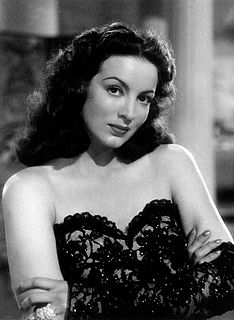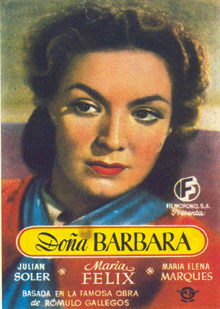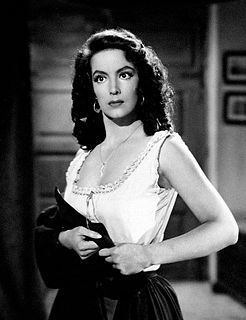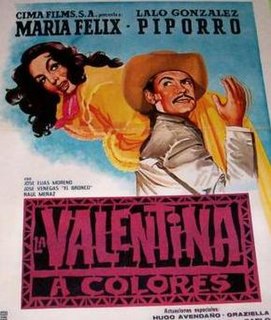 W
WMaría de los Ángeles Félix Güereña, known as María Félix, was a Mexican film actress and singer. Along with Pedro Armendáriz and Dolores del Río, she was one of the most successful figures of Latin American cinema in the 1940s and 1950s. Considered one of the most beautiful actresses of Mexican cinema, her taste for the finesse and strong personality garnered her the title of diva early in her career. She was known as La Doña, a name derived from her character in the film Doña Bárbara (1943), and María Bonita, thanks to the anthem composed exclusively for her, as a wedding gift by her second husband, the Mexican composer Agustín Lara. She completed a film career that included 47 films made in Mexico, Spain, France, Italy and Argentina.
 W
WEnrique Álvarez Félix was a Mexican actor, known for his roles in telenovelas and in films, such as The Monastery of the Vultures and The House of the Pelican.
 W
WBeyond All Limits is a 1959 Mexican drama film directed by Roberto Gavaldón. It was entered into the 9th Berlin International Film Festival.
 W
WDoña Bárbara is a 1943 Mexican romantic drama film directed by Fernando de Fuentes and starring María Félix and Julián Soler. The film is based on the 1929 novel Doña Bárbara by Venezuelan author Rómulo Gallegos, who also co-wrote the screenplay.
 W
WFrench Cancan is a 1955 French-Italian musical film written and directed by Jean Renoir and starring Jean Gabin and Francoise Arnoul. Where Renoir's previous film Le Carosse d’or had celebrated the 18th-century Italian commedia dell’arte, this work is a homage to the Parisian café-concert of the 19th century with its popular singers and dancers. Visually, the film evokes the paintings of Edgar Degas and the Impressionists, including his own father, Pierre-Auguste Renoir. It also marked his return to France and to French cinema after an exile that began in 1940.
 W
WÁngel Agustín María Carlos Fausto Mariano Alfonso del Sagrado Corazón de Jesús Lara y Aguirre del Pino, known as Agustín Lara, was a Mexican composer and interpreter of songs and boleros. He is recognized as one of the most popular songwriters of his era. His work was widely appreciated not only in Mexico but also in Central and South America, the Caribbean and Spain. After his death, he has also been recognized in the United States, Italy and Japan.
 W
WMaría Teresa Lara Aguirre del Pino was a Mexican lyricist and composer.
 W
WMaclovia is a 1948 Mexican romantic drama film directed by Emilio Fernández and starring María Félix and Pedro Armendáriz.
 W
WMaría bonita is the seventh studio album by Mexican pop singer Manuel Mijares. It was released on May 19, 1992.
 W
WThis is a filmography of María Félix, who began her career in 1942. Her role in the movie Doña Bárbara transformed her into the vamp of 1940s Mexican cinema. After her roles in the Emilio Fernández movies like Enamorada (1946), Río Escondido (1948) and Maclovia (1948), she achieved great fame in Europe.
 W
WJorge Alberto Negrete Moreno was a Mexican singer and actor.
 W
WThe Soldiers of Pancho Villa is a 1959 Mexican epic historical drama film co-written, produced, and directed by Ismael Rodríguez, inspired by the popular Mexican Revolution corrido "La Cucaracha". It stars María Félix and Dolores del Río in the lead roles, and features Emilio Fernández, Antonio Aguilar, Flor Silvestre, and Pedro Armendáriz in supporting roles.
 W
WLa Valentina is a 1966 Mexican romantic comedy film directed by Rogelio A. González, produced by Gregorio Walerstein, and starring María Félix and Eulalio González in the leading roles. The supporting cast features José Elías Moreno, José Venegas, and Raúl Meraz. The film is a dramatization of the Mexican Revolution corrido of the same name.